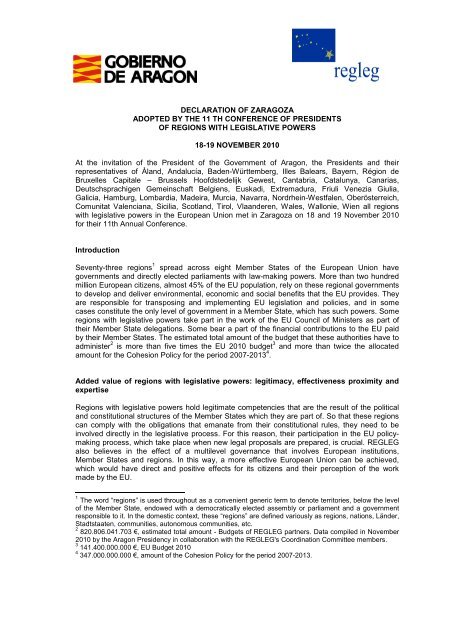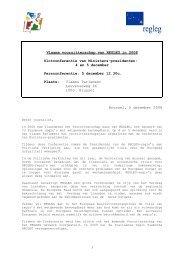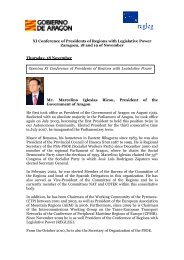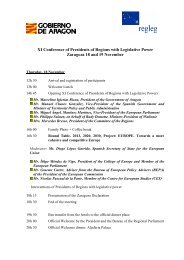Zaragoza Declaration FINAL+_EN - RegLeg
Zaragoza Declaration FINAL+_EN - RegLeg
Zaragoza Declaration FINAL+_EN - RegLeg
You also want an ePaper? Increase the reach of your titles
YUMPU automatically turns print PDFs into web optimized ePapers that Google loves.
DECLARATION OF ZARAGOZA<br />
ADOPTED BY THE 11 TH CONFER<strong>EN</strong>CE OF PRESID<strong>EN</strong>TS<br />
OF REGIONS WITH LEGISLATIVE POWERS<br />
18-19 NOVEMBER 2010<br />
At the invitation of the President of the Government of Aragon, the Presidents and their<br />
representatives of Åland, Andalucía, Baden-Württemberg, Illes Balears, Bayern, Région de<br />
Bruxelles Capitale – Brussels Hoofdstedelijk Gewest, Cantabria, Catalunya, Canarias,<br />
Deutschsprachigen Gemeinschaft Belgiens, Euskadi, Extremadura, Friuli Venezia Giulia,<br />
Galicia, Hamburg, Lombardia, Madeira, Murcia, Navarra, Nordrhein-Westfalen, Oberösterreich,<br />
Comunitat Valenciana, Sicilia, Scotland, Tirol, Vlaanderen, Wales, Wallonie, Wien all regions<br />
with legislative powers in the European Union met in <strong>Zaragoza</strong> on 18 and 19 November 2010<br />
for their 11th Annual Conference.<br />
Introduction<br />
Seventy-three regions 1 spread across eight Member States of the European Union have<br />
governments and directly elected parliaments with law-making powers. More than two hundred<br />
million European citizens, almost 45% of the EU population, rely on these regional governments<br />
to develop and deliver environmental, economic and social benefits that the EU provides. They<br />
are responsible for transposing and implementing EU legislation and policies, and in some<br />
cases constitute the only level of government in a Member State, which has such powers. Some<br />
regions with legislative powers take part in the work of the EU Council of Ministers as part of<br />
their Member State delegations. Some bear a part of the financial contributions to the EU paid<br />
by their Member States. The estimated total amount of the budget that these authorities have to<br />
administer 2 is more than five times the EU 2010 budget 3 and more than twice the allocated<br />
amount for the Cohesion Policy for the period 2007-2013 4 .<br />
Added value of regions with legislative powers: legitimacy, effectiveness proximity and<br />
expertise<br />
Regions with legislative powers hold legitimate competencies that are the result of the political<br />
and constitutional structures of the Member States which they are part of. So that these regions<br />
can comply with the obligations that emanate from their constitutional rules, they need to be<br />
involved directly in the legislative process. For this reason, their participation in the EU policymaking<br />
process, which take place when new legal proposals are prepared, is crucial. REGLEG<br />
also believes in the effect of a multilevel governance that involves European institutions,<br />
Member States and regions. In this way, a more effective European Union can be achieved,<br />
which would have direct and positive effects for its citizens and their perception of the work<br />
made by the EU.<br />
1 The word “regions” is used throughout as a convenient generic term to denote territories, below the level<br />
of the Member State, endowed with a democratically elected assembly or parliament and a government<br />
responsible to it. In the domestic context, these “regions” are defined variously as regions, nations, Länder,<br />
Stadtstaaten, communities, autonomous communities, etc.<br />
2 820.806.041.703 €, estimated total amount - Budgets of REGLEG partners. Data compiled in November<br />
2010 by the Aragon Presidency in collaboration with the REGLEG's Coordination Committee members.<br />
3 141.400.000.000 €, EU Budget 2010<br />
4 347.000.000.000 €, amount of the Cohesion Policy for the period 2007-2013.
Regions with legislative powers constitute the level of government closest to the citizens and<br />
whose active role increases transparency, allows for better governance and offers opportunities<br />
for the democratic involvement in public policy-making. The Governments of these regions hold<br />
both political and technical expertise, available for collaboration in the strengthening of EU<br />
policies. In this sense, the regions with legislative powers pro-actively accept their<br />
responsibilities and are prepared to work with Member States and EU institutions to produce<br />
and, where appropriate, implement effective policy devised in the interests of the citizen.<br />
I. The Treaty of Lisbon – towards the first anniversary of the application<br />
REGLEG has worked consistently over 10 years to contribute to the process that eventually<br />
resulted in the Lisbon Treaty. This journey began at Laeken and ended, finally, in Lisbon. The<br />
Presidents welcome the Lisbon Treaty and commit to monitoring its effectiveness for citizens. In<br />
particular they will monitor the effectiveness of the provisions relating to subsidiarity and they<br />
will judge, over time, whether this delivers results for national and regional parliaments and<br />
citizens.<br />
The Presidents congratulate the Trio EU Presidency for the launch of the institutional changes<br />
established by the new Treaty, and for the boost of the European regional dimension. They<br />
advocate for this boost to be continued by the forthcoming Presidencies and they wish for a<br />
closer cooperation with the European institutions to achieve these objectives. This could be<br />
translated in an increased involvement of regions with legislative powers in the policy<br />
formulation and in the decision-making process, as REGLEG is being requesting from its<br />
beginnings and as the ‘Partner Regions of the EU’ concept encapsulates.<br />
In this context, the Presidents look forward to the results of the current trio of presidencies of the<br />
EU - Spanish, Belgian and Hungarian on a ‘roadmap’ with the aim of ‘making a qualitative leap<br />
in the participation of local and regional bodies’ in defining and developing the policies of the<br />
EU, particularly the proposals related to the empowerment of the Committee of the Regions and<br />
to the mechanisms to put in place multilevel governance as conceived in the Committee of the<br />
Regions White Paper on the matter. On this matter, the Presidents also encourage the<br />
Committee to present the Multilevel Governance Charter and the Scoreboard on Multilevel<br />
Governance in order to asses and inform about the situation of European governance.<br />
Multilevel governance together with the institutional cooperation mechanisms should address<br />
the need for of a coordinated action of the EU, Members States and regional and local<br />
authorities in the application of EU policies in order to build Europe in partnership. Subsidiarity is<br />
a key part of multilevel governance, and a crucial factor to bring Europe closer to citizens, given<br />
that EU decisions must be taken as closely as possible to its people. At the same time, the<br />
Presidents demand a coherent implementation of the new principle of territorial cohesion<br />
established in the Lisbon Treaty which should become a guiding principle of the EU policies.<br />
The Presidents are mindful of the meaning and consequences of the Article 4 § 2 of the Treaty,<br />
which for the first time in EU-history not only recognizes the national identity of the Member<br />
States, but also the political and constitutional structure, including regional and local self<br />
government inherent in this national identity. More particularly they highlight the importance of<br />
the Protocol (No 26) on services of general interest, which underlines the essential role and the<br />
wide discretion of national, and explicitly of regional authorities in providing, commissioning and<br />
organising services of general economic interest. REGLEG will contribute to the elaboration and<br />
further institutional recognition of regions, in line with the new definitions, and underlines the<br />
relevance of regions with legislative powers in this context.<br />
Also in light of Article 4 § 2 of the Treaty on European Union, the Presidents ask for guarantees<br />
regarding a wider use of languages with co-official status from Regions with Legislative Power in<br />
EU institutions, taking into account that the financial burden for such provisions lies with the<br />
requesting authorities.<br />
2
The Presidents wish to renew their commitment for the efficient application of the Treaty,<br />
assuming responsibility and also making good use of the opportunities that it offers.<br />
II. Challenges until 2013: Cohesion - Budget review – Budgetary stability – Financial<br />
Perspectives<br />
Cohesion policy, from a regional approach, contributes considerably to the implementation of<br />
the renewed Lisbon strategy. Regions falling under the ‘Convergence’ objective and regions<br />
under the ‘Regional Competitiveness and Employment’ objective have an important role in the<br />
promotion of innovation and competitiveness in the EU. Therefore it is of the utmost importance<br />
that the current Cohesion objectives are maintained under Cohesion policy post 2013.<br />
The Presidents welcome the Fifth Report on economic, social and territorial cohesion presented<br />
by the European Commission, particularly its intention to involve all levels of government to<br />
overcome the economic crisis .Also they agree with the report’s acknowledgement of the key<br />
role that EU cohesion policy plays in translating the Europe 2020 targets into practice, although<br />
the Presidents would like to insist on the importance of maintaining the Cohesion policy main<br />
objective which is the reduction of wealth gaps between regions. On the other hand, REGLEG<br />
partners share the concerns expressed by the Committee of the Regions in its ‘Contribution of<br />
Cohesion Policy to the Europe 2020 Strategy’ related to the negative effect of the multiplication<br />
of sector-specific EU funding programmes and are also in favour of keeping the European<br />
Social Fund in the cohesion policy framework.<br />
The EU Budget provides the instruments through which programmes can be implemented. The<br />
Presidents call on the institutions to note that EU programmes are frequently implemented at the<br />
regional level. This regional approach needs to be maintained and should be reflected in the<br />
language of all relevant Commission documents and strategies. REGLEG partners further urge<br />
them to maintain the current Structural Funds that must continue to form the basis of cohesion<br />
policy and shall keep taking into account the different development needs. In this way we can<br />
implement the essential principle of solidarity and territorial cohesion.<br />
The Presidents of regions with legislative powers underline the impact of the budgets they are<br />
responsible for and the role of these regions regarding the responsible management of public<br />
finances and achievement of budgetary stability. In this sense, they understand that the priority,<br />
in the context of current crisis, should be the reduction of the deficit, nonetheless they show their<br />
worries about the possible effects that this can have in the incipient growth of the regional<br />
economies.<br />
The Presidents request from the European Commission a proposal on the mechanisms allowing<br />
regions with legislative powers to participate in the decision-making process related to the new<br />
economic governance. In order to comply with the objectives of the coordination of the<br />
economic policy, the EU has to involve proportionately the regional authorities, in particular<br />
taking into consideration the regional competencies of some regions in taxes, finances and<br />
budget.<br />
The Presidents are concerned about the cuts and the architecture of the sanction mechanisms<br />
that the EU plans to introduce in regional policy’s instruments and the way it will affect regional<br />
economies. For regions with legislative powers, it is important that these investments will not<br />
drop drastically and that they will not damage the advances achieved in the field of cohesion,<br />
which increase economic activity and reduce social disparities.<br />
The Presidents welcome the efforts undertaken by the Presidency Trio in the EU to promote<br />
cooperation between European territories in order to improve the economic growth. In particular,<br />
they take note of the debates in the Informal Meeting of Territorial Policy Ministers held in<br />
Malaga on the role of local and regional authorities in economic recovery, and in the definition of<br />
a new sustainable economic model, as key issues for the economic recovery and job creation,<br />
as well as for the definition of the European new strategy of growth ‘Europe 2020’.<br />
3
REGLEG also expects that the adoption of the next multiannual financial framework will give a<br />
sustained impulse to Cohesion policy and that sufficient resources must also be earmarked from<br />
the EU budget to support balanced territorial development in Europe.<br />
III. Challenges Europe 2020<br />
Europe has been plunged into deep economic crisis. The priority for Europe is to exit the crisis<br />
and move towards sustainable growth and prosperity. Therefore, regions have great challenges<br />
ahead, mainly, the creation of jobs and growth. In many cases legislative regions are motors of<br />
the European economy and we have special responsibilities for working with the EU institutions<br />
and Member States to create the conditions for sustainable growth.<br />
REGLEG welcomes the European Commission’s recognition that “[...] we need a strategy for<br />
convergence and integration which recognises more explicitly the advanced interdependence of<br />
the EU: [...] Interdependence between different levels of government (EU, Member States,<br />
regions, social partners - multi-layer governance); [...]’ 5 . It also welcomes the decision of the<br />
European Council, upon adopting Europe 2020, that “National parliaments, social partner,<br />
regions and other stakeholders will be involved, so as to increase ownership of the strategy” 6 .<br />
Nevertheless, the establishment of a clear governance structure to make the new strategy<br />
effective has not been sufficiently developed in the Strategy. Furthermore, this aspect is<br />
characterized by the lack of any explicit recognition of the role that regions with legislative<br />
powers play in the relevant aspects of the new strategy: formulation, implementation and<br />
monitoring.<br />
By establishing a permanent dialogue between various levels of governance, the priorities of the<br />
Union are brought closer to the citizens, strengthening the ownership needed to deliver Europe<br />
2020 strategy.<br />
Experience has shown from the implementation of former Lisbon Strategy that the success of<br />
the strategy for sustainable growth and jobs depends significantly on the active involvement of<br />
regional authorities. It therefore goes without saying that knowledge and capacities of the<br />
regions with legislative powers should be recognized on the national and European level and<br />
that they should have the opportunity as far upstream as possible to put forward their ideas<br />
according to their regional organization with regard to the newly adopted Europe 2020 strategy.<br />
The Presidents support the proposal of the European Parliament and of the Committee of the<br />
Regions on the establishment of a Territorial Pact for Europe 2020 that stimulates the<br />
contribution of regions to the success of its objectives.<br />
IV. Challenges 2030 - In line with the Report of the reflection group on the future of the<br />
EU in 2030<br />
The Presidents take note of the document elaborated by the reflection group on the future of the<br />
EU in 2030, which presents the current crisis as a warning sign. They agree that there is a need<br />
of start an ambitious long-term reform programme for the next twenty years organised around<br />
seven priorities in which regions with legislative powers should take an active part: the renewal<br />
of the economic and social model; to privilege the growth through the knowledge; the beginning<br />
of a genuine industrial revolution to tackle the issues of energy security and climate change; to<br />
take up the demographic challenge to counterbalance the negative trends; to guarantee the<br />
external and internal security of the EU despite the unstable new world order; to confirm the<br />
place of the EU on the world stage and playing a leading role in establishing the new rules of<br />
global governance; and to strength the general public's feeling of belonging to the EU.<br />
5 COM(2009)647 final<br />
6 European Council conclusions, 25-26 March 2010 §6, i<br />
4
The Presidents share the idea of the Reflection group that delivering ‘good governance’ is by far<br />
the EU’s most powerful means of ensuring the continuous commitment and engagement of its<br />
citizens. They also agree that this ‘good governance’ should be based on the principles of<br />
openness, participation, power sharing, accountability, partnership and effectiveness and the<br />
respect of the principle of subsidiarity. Governance should take place for but also with the<br />
citizens.<br />
The Presidents also consider absolutely necessary to give more transparency and accuracy to<br />
the way in which the political decision-making of the EU is communicated. They are convinced<br />
that European regions must assume a leading role in communicating and informing citizens<br />
about the European Union. Therefore, they encourage the EU institutions to continue the<br />
process of decentralisation of information and communication in favour of European regions<br />
through cooperation and provision of tools and resources to bring the EU closer to its citizens<br />
and to mobilize European citizens to participate actively in European construction. Transparency<br />
generates trust, and trust brings about the interest of citizens to participate in public life.<br />
In this context, regions with legislative powers, which have competences and instruments<br />
facilitating an active role for civil society, will contribute to the call for political leadership and a<br />
strong agenda to reform the European Union so that the gap between the potential power of<br />
Europe and its real power will come to an end by 2030.<br />
V. Future of REGLEG – priorities<br />
From its beginnings, members of REGLEG have collaborated between themselves having as a<br />
main goal to be heard in the debate on the institutional reform. The Presidents reaffirm that<br />
REGLEG, as a network representing the interest of the regions with legislative powers, will<br />
continue its work to promote and defend a greater involvement of these regions in the decisionmaking<br />
process of the EU and in the implementation of the European Union legislation.<br />
Presidents want to strengthen the visibility and influence of REGLEG in the European structure,<br />
in order to enhance the representation of the interests of Regions with Legislative Powers,<br />
ensuring the effective participation of these regions in the decision-making process of the EU<br />
and also giving a strong contribution towards their explicit recognition as actors involved in the<br />
relevant aspects of the multi-governance strategy.<br />
The Presidents take note that during the present year cooperation has been strengthened with<br />
other European bodies and associations, such as the Committee of the Regions, the Congress<br />
of Local and Regional Authorities of the Council of Europe and the Conference of Regional<br />
Assemblies of Europe, with where the collaboration will be continued in order to move forward in<br />
the main topics of European policy.<br />
In addition, they are pleased with the common positions established in the present year and<br />
they are determined to continue their coordination in order to give their opinion to the EU<br />
institutions, especially to the European Commission, via its open consultation.<br />
The Presidents will include the following priorities and topics in their 2011 agenda:<br />
- To continue tackling the challenges of the financial and economic crisis<br />
- To continue informing to the European institutions as well as the citizens about the role<br />
and the responsibilities of the Regions with Legislative Powers<br />
- To continue contributing to the reflexion process on the future of the EU<br />
- To continue with the development of the concept of ‘Partner Regions of the Union’<br />
- To participate in the design and implementation of the future cohesion policy, as well as<br />
the definition and implementation of the concept of territorial cohesion.<br />
- To participate in the implementation and the monitoring of the Europe 2020 Strategy.<br />
- To follow-up the consultation on the EU budget review and the next financial framework<br />
to be proposed by the new Commission<br />
5
- To continue cooperation with the Conference of European regional legislative<br />
assemblies (CALRE) on the basis of a common strategy<br />
- To support the work of the Congress of Local and Regional Authorities of the Council of<br />
Europe in the fields of common interest<br />
- To contribute to the initiative about the presentation of the Multilevel Governance<br />
Charter and the Scoreboard on Multilevel Governance in order to asses and inform<br />
about the situation of European governance.”<br />
- To make good use of the opportunity that the review of the Regulation on the European<br />
Grouping of Territorial Cooperation represents in order to remove the obstacles that the<br />
regions with legislative powers are facing at the national and European level<br />
- To reflect on the 5 th Cohesion Report and the challenges it identifies.<br />
The participants of the 11th Conference of Presidents of Regions with Legislative Powers<br />
(REGLEG) ask all partner regions in the network to support these conclusions and<br />
recommendations at the national and the EU level.<br />
They ask the Presidency to transmit them also to the European Institutions and bodies.<br />
Adopted in <strong>Zaragoza</strong> on 19 November 2010<br />
6






